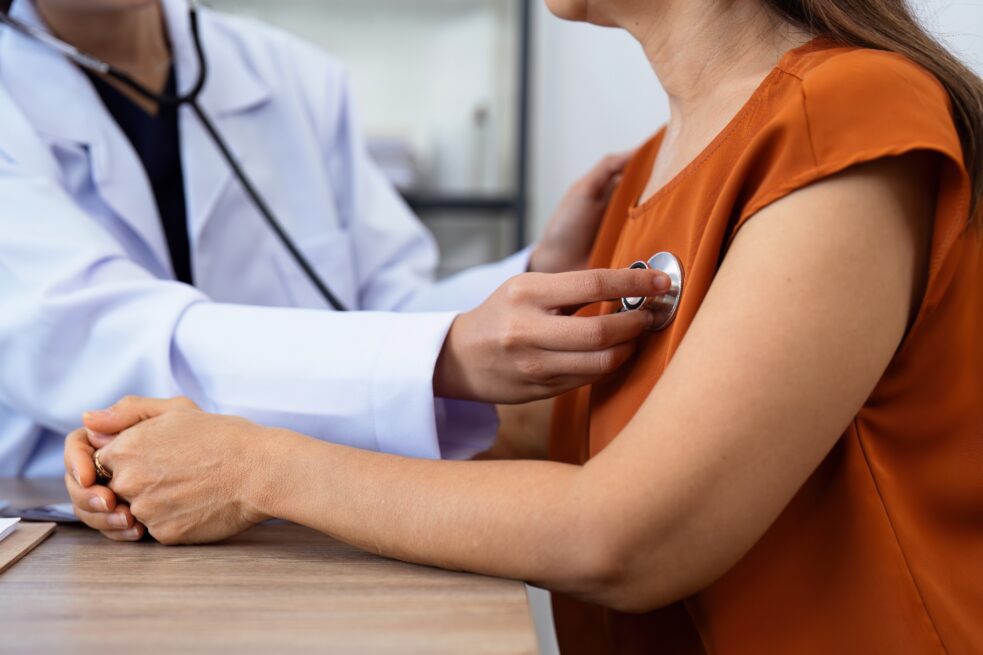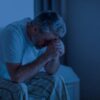Melodie Henderson once had the stamina to dance with her husband all night. By 2021, though, she found herself gasping for air, resting through songs, and struggling to complete the four-mile walks that had long been part of her routine. At night, she was unable to sleep on her back, the fluid in her lungs leaving her gasping and choking. And by the end of the year, reaching the top of her staircase left her winded.
As a breast cancer survivor in her seventh year of remission, the special education coordinator from Chesterfield, Virginia, had hoped her harrowing medical journey was behind her. But Henderson’s doctors never told her that the cancer treatment drugs that saved her life could cause lasting damage to her heart in the process.
“I had a perfectly healthy heart before cancer treatment,” says Henderson. “My heart’s not so healthy anymore.”
Henderson is living with congestive heart failure, one of the many heart problems that can result from chemotherapy. For decades, doctors have known that breast cancer patients face a heightened risk of heart damage from commonly used cancer drugs. Yet gaps in physician and patient education — and post-cancer care that too often overlooks women most in need of close monitoring — have left Henderson among the hundreds of thousands of American women now living with chemotherapy-induced heart disease.
When Oncologists and Cardiologists Don’t Talk, Patients Pay the Price
In 2018, the American Heart Association issued its first statement drawing attention to the high rates of heart disease among breast cancer survivors. Because breast cancer and heart disease share many of the same risk factors, it can be hard to determine how many of these cases are directly due to the cardiotoxicity of chemotherapy drugs. Still, research has shown that about 6% of breast cancer survivors treated with anthracyclines, a commonly used class of chemotherapy drugs, develop clear signs of heart damage.
While individuals with other types of cancers treated with anthracyclines are also susceptible to cardiotoxicity, breast cancer survivors are especially vulnerable. That’s because their treatment often combines anthracyclines with HER2-targeted drugs, therapies that about a quarter of breast cancer patients receive despite their known effect of weakening the heart’s left ventricle. Patients also undergo radiation near the heart, which further strains the muscle.
When the AHA issued its statement, Henderson, then 52, was beginning her chemotherapy and radiation journey at Johnston-Willis Hospital in Richmond, Virginia. Her type 2 diabetes, combined with the fact that Black women face higher rates of heart disease, placed her at greater risk for developing cardiotoxicity. But Henderson says her doctors only briefly mentioned her heart could be impacted by the drugs, offering little detail about how or how serious the risk might be.
Removing the drugs from Henderson’s treatment plan could never be an option. They were essential in fighting the more immediate threat: cancer.
“Generally, the benefits outweigh the risks,” agrees Jaya Mallidi, M.D., a clinical associate professor at University of California, San Francisco. “And if the patients do develop symptoms of congestive heart failure, we have really good medications.”
The real problem was that Henderson’s oncologists seemingly overlooked how her preexisting conditions raised her risk, and failed to connect her with a specialist who could have monitored for early signs of heart disease.
Ideally, Henderson would have been referred to a cardio-oncologist, a specialist with specific expertise on cancer drug side effects on the heart. But it’s a small field, so there aren’t enough cardio-oncologists to help every cancer patient. “There’s not too many of us with this expertise,” says Han Zhu, M.D., an assistant professor of cardiovascular medicine at Stanford University School of Medicine with a clinical focus on cardio-oncology.
Even a referral to a regular cardiologist would have been helpful, but oncologists and cardiologists too often work in separate silos, and in Henderson’s case, no referral was made.
The Cost of Missed Warnings, and How Some Doctors Are Pushing for Change
Henderson first started experiencing symptoms of heart failure in 2021, three years after her treatment. Fluid filled her abdomen, she had a hacking cough, and she could hardly breathe. But she attributed her growing discomfort to an unrelated spinal surgery and swelling from lymphedema that she had around that time.
Although her symptoms fit the classic picture of congestive heart failure, Henderson had no idea they were warning signs she should recognize.
As her symptoms worsened, she saw a series of cardiologists. The first two missed the connection between her history of breast cancer and the chemotherapy drugs she’d received, overlooking the possibility that those cardiotoxic treatments were contributing to her heart problems. Though Henderson was in significant discomfort, she was eventually diagnosed with two irregular heartbeat conditions considered manageable. It wasn’t until a third cardiologist looked through her medical records that Henderson learned she had congestive heart failure — a disease the doctor told her was likely caused by chemotherapy drugs.
Even if patients are warned of the risk of cardiotoxicity, it can be hard to retain that information in the immediate aftermath of a cancer diagnosis. In 2012, Jess Whorton, then a 33-year-old who worked in human resources in Phoenix, Arizona, was diagnosed with stage 3 breast cancer. The shock of being diagnosed with a life-threatening condition meant she paid little attention to her doctor mentioning how chemotherapy could have side effects on the heart. “When you’re in the middle of a crisis, it’s hard to think clearly,” she notes.
It was the only time her doctor mentioned cardiotoxicity.
Before starting chemotherapy, Whorton underwent a single ultrasound to confirm her heart was healthy. As a young patient with no prior medical issues, doctors saw no need for follow-up testing during treatment. But just two years later, she was diagnosed with two heart conditions, and her ejection fraction — a measure of how well the heart pumps blood — fell to 45%, well below the normal range of 55 to 70%.
Although Whorton appeared low-risk on paper, her case underscores how unpredictable cardiotoxicity can be, and why doctors often struggle to determine which of the more than four million breast cancer survivors in the U.S. are most vulnerable. To address this, Susan Dent, M.D., a cardio-oncologist at the University of Rochester in Rochester, New York, and president of the International Cardio-Oncology Society, is developing a risk score system to help identify patients who would benefit from closer monitoring by a cardio-oncologist during and after chemotherapy.
More broadly, cardio-oncologists are working to improve education for both patients and providers. A person with cancer may see many specialists during the course of treatment: a primary care doctor, surgeon, oncologist, cardiologist, imaging technician, and others. “Educating all these healthcare providers [on cardiotoxicity] is necessary,” says Dr. Dent.
To facilitate communication between specialists, Dr. Dent emphasizes the need for more user-friendly resources. Current guidelines that help doctors evaluate cardiotoxicity risks can be more than one hundred pages long. Dr. Dent is pushing to adapt these criteria into a simplified checklist that all types of healthcare providers can reference quickly and efficiently. “This would be a huge step forward so that we get the appropriate people in to see a cardio-oncologist or a cardiologist earlier rather than later,” she said.
Time can also complicate things: Cardiotoxicity can develop long after chemotherapy is administered, sometimes decades later.
“During survivorship, there is no adequate surveillance; they kind of fall off the curve, because nobody has been following up with them during survival,” says Dr. Mallidi.
To combat this issue, doctors are working to provide patients with tools to track their heart risks themselves, even after regular monitoring stops. Tools such as smart watches that can detect irregular heart function may be one key to helping survivors better monitor themselves and catch symptoms early, says Joerg Herrmann, M.D., a professor of medicine and cardio-oncologist specialist at Mayo Clinic.
“The single greatest barrier towards long-term survivorship is having the patient come to you with the later stages of heart failure instead of actively looking for it,” he said. “We are trying to develop a model so the patient can monitor themselves at home for a lifetime.”
Today, Whorton and Henderson are both making strides towards a healthy future. Whorton is finishing business school while working as a part-time volunteer for several nonprofits. Henderson is a mentor for other people navigating their breast cancer journey through a nonprofit organization called After Breast Cancer Diagnosis. She hopes her experiences will help them know what questions to ask of their doctors, so that they never have to find out about missed opportunities in the brutal way she did.
After her heart disease diagnosis, Henderson says she requested her medical records. She felt her doctors were great at addressing the cancer, but any health issues beyond that were left off the table. After combing through hundreds of documents, she discovered that the few echocardiograms she received during her treatment had detected early signs of heart damage. But no one had told her. “I felt like I was dismissed as a human being. I felt like my care was not taken into full consideration.”
What to Ask Your Doctor Before Starting Chemotherapy
Both Henderson and Whorton shared their recommendations and tips for how new patients can help protect themselves during their treatment.
They strongly suggest bringing a trusted advocate to the appointment, whether that be a partner, friend, or family member, to help absorb information and ask the right questions. Henderson also advises taking diligent notes when speaking with a doctor and to ask for any medical jargon to be explained.
“I have learned to do that over the years of not getting all the information,” she says. “I make sure to ask doctors ‘help me understand how that will impact my life?’”
Additional questions patients might want to ask their doctor include:
- What symptoms should I be looking out for that might indicate something is wrong with my heart?
- What is my risk of developing heart complications during treatment? If this happens, how do you plan on handling it?
- How might this medication damage my heart? What side effects might linger for months or years later?
- Can I be regularly monitored by a cardiologist throughout my treatment?
- Can I have a full echocardiogram before starting treatment?
- If I start experiencing symptoms of heart failure, who should I call, how quickly can I expect someone to respond, and what is considered an emergency?
Advocating for yourself is a part of the healing journey, says Whorton. It’s ok to ask questions more than once and rely on others to help you understand new information, she says.
“You’re not being ‘difficult’ by asking questions,” she adds, “you’re being thorough about your own life.”






